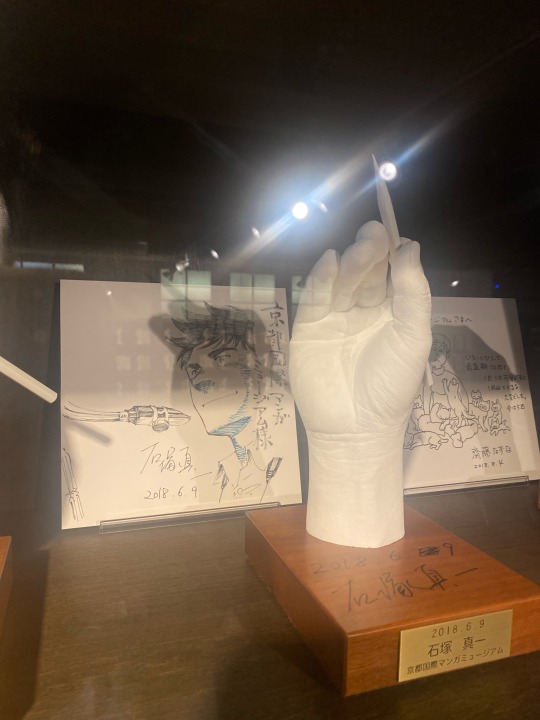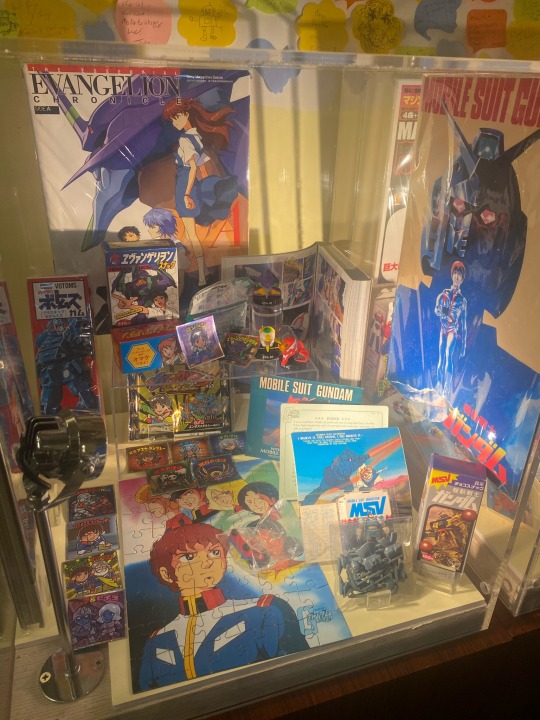#Eike Exner
Explore tagged Tumblr posts
Text
Manga: A New History of Japanese Comics by Eike Exner announced for 2025
Yale University Press have announced they will be publishing Will Eisner Comic Industry Awards-winning author Eike Exner new history of Japanese comics next August
Yale University Press have announced they will be publishing Will Eisner Comic Industry Awards-winning author Eike Exner new 256-page history of Japanese comics next August. The publisher of Manga: A New History of Japanese Comics describes the book as “the groundbreaking story of Japanese comics from their nineteenth-century origins to the present day. “The immensely popular art form of manga,…
2 notes
·
View notes
Text
June 18 - Kyoto International Manga Museum
Today is the day I’ve been looking forward to the most. It felt like I was traveling to the Mecca of my hobby, and while I received no divine visions for my cross world pilgrimage here it was still amazing. The museum presides within a old elementary school, and basically functions as a massive library housing manga as early as the Prewar period. Recently back home I found a copy of Tank Tankuro which is the only Prewar manga I own, and it was so nice seeing it on the shelves here among the few Prewar books that have been collected by the museum. While I don’t understand Japanese just by opening up a random book and flipping through the pages I continue to be in awe at the range of topics, art, and storytelling tackled by manga. While I love films, I feel like manga (and comics by extension) are a unlimited art form not bound by funding or feasibility of creation. You can make any image and any story you want. Thankfully the gift shop wasn’t to alluring (I was seriously worrying) but I did end up finding the first volume of Hokusai manga (the second I found on our first day) so now I have about 800 pages of his beautiful prints. While I know he isn’t connected to the manga I read today, I would still argue inspiration exists at least in the visual aesthetics pursued through Japan (which I love). At the museum we were also treated to a kamishibai performance, which are paper plays voiced by an operator who manipulates images in a small screen. This can be seen almost as a precursor to manga, before humans were able really conceptualize sound image. Once the performance ended my whole class left, but I saw that in the English library they had volumes of Phoenix which can reach hundreds of dollars. With this in mind I stayed for about an extra 2 hours reading what is considered Tezuka’s masterwork. In all honesty it just wasn’t for me. At one point a character stabs another, while declaring his love for her. As she bleeds out they make out and I just had to put it down for a bit. I ignored my hunger while reading but once I left I quickly ran over to the Sukiya across the street which provides quick food at a questionable quality. In preparation for our day trip I chose to rest for the day, finding a yummy French bistro which was equally as affordable but way better.
Academic Reflection
Reading this paper was like butter. It took me about 30 minutes, but I guess that’s what happens when it’s about something you love. I was truly surprised at the quality of this writing, as some papers I’ve read have been really hit or miss. This paper not only provided a wide range of arguments about the possible origin of manga (correctly citing Bringing up Father, which the book Comics and the Origins of Manga by Eike Exner which I’ve been reading also cites) but also described why these arguments exist. I found this of particular interest, as those who argue for mangas connection to ancient Japanese art forms do so in an attempt to legitimize manga as important to Japanese culture. This is because (similarly to video games in the West) manga has been demonized by the broader society as a sort of deviant activity which promotes further deviant behaviors. On it’s face this is wrong, but it also gets closer to issues of class that are faced abroad (more specifically in Japan) regarding how those with privilege view art created and consumed by those of a lower class. These individuals may feel frustrated because manga/anime has become a major (if not the main) cultural export of Japan versus its other high art forms like kabuki, noh, etc. I personally find this sad, but as more and more Japanese people consume manga regularly perspectives are bound to continue to change into the future.
Continuing off manga as a low class art, the papers mention of gekiga made me happy. Recently in my own manga collection, I have been diving deep into gekiga with authors like Tadao Tsuge, Yoshihiro Tatsumi and Yoshikazu Ebisu (Yuichi Yokoyama as well however he is part of another gekiga wave). These authors brought a new energy which was vital for the continued evolution of manga into the future. Without names like these (and many many more) I don’t think we would have manga like it is today. Even though I couldn’t read them I flipped through some of these authors book, and the power of their composition/art was enough to follow the stories.
I was also shocked to see how profitable the manga industry is with it reaching into the billions of dollars. The museum and reading broaches the topic of piracy. I couldn’t even begin to imagine the potential profit numbers of piracy for manga didn’t exist on the scale it does (and the scale is truly massive). However, this reading and our past reading on otaku culture show how ingrained into manga culture derivative work/piracy is. Personally, I engage heavily into this community reading leaks for manga like Jujutsu Kaisen weekly and reading scanlations of manga that will likely never get English releases (I value reading manga physically so I will wait if the possibility exists). For manga like Jujutsu Kaisen I purchase the volumes on release in the West, and I think this is why piracy is allowed. Not only would it be very difficult to crack down on all the scanlation teams (manga publishers would likely have to invest into groups of lawyers which would be costly), but they effectively act as free advertising. While this may be a divisive take for people who are hardline on intellectual property law, I think manga would exist as an interesting case study when a medium and this underbelly synthesis together.






1 note
·
View note
Text
The Manga Review, 5/20/22
This year’s Eisner nominations have just been announced. In the Best U.S. Edition of International Material—Asia category, VIZ Media garnered five of the six nominations with crowd-pleasers such as Chainsaw Man and Spy x Family, while Seven Seas garnered one for Robo Sapiens: Tales of Tomorrow. The only other manga nominated for an Eisner was Zom 100: Bucket List of the Dead, which is competing in the Best Humor Publication category. Also nominated for an Eisner is Eike Exner’s Comics and the Origins of Manga: A Revisionist History, a scholarly work published by Rutgers University Press.
MANGA NEWS
Big news from Seven Seas, which just launched two new imprints: Seven Seas BL, which will publish works in the BL/Boys’ Love genre, and Seven Seas GL, which will publish works in the GL/Girls’ Love (yuri) genre. [Seven Seas]
The final chapter in Wataru Hinekure’s My Love Mix-Up! will run in the June issue of Bessatsu Margaret. [Anime News Network]
Brigid Alverson previews three new shonen titles that debut in July. [ICv2]
Over at Book Riot, Carina Pereira highlights eight of the summer’s most anticipated graphic novels. [Book Riot]
How do librarians respond book challenges in their communities? Shawn, Megan, and Tayla offer a variety of helpful strategies for handling complaints about graphic novels, from setting clear policies about who can bring a formal complaint to using peer-reviewed sites to demonstrate that your collection is, in fact, age-appropriate. [No Flying, No Tights]
FEATURES AND INTERVIEWS
Looking for a good read? The crack team at ANN have just posted their Spring 2022 Manga Guide, shining a light on this season’s newest titles. Look for daily updates through the end of this week. [Anime News Network]
Tony explores the complex friendship between Kaguya Shinomiya and Ai Hayasaka in Kaguya-sama: Love Is War. [Drop-In to Manga]
On the latest Manga Mavericks podcast, host Siddharth Gupta convenes a roundtable discussion about Yona of the Dawn with panelists from Anime Feminist, But Why Tho?!, and Good Friends Anime Club. [Manga Mavericks]
Geremy and Kevin round up the latest Shonen Jump chapters, then turn their attention to volume thirteen of Haikyu!! [Jump Start Weekly]
Why did Nobuhiro Watsuki’s Gun Blaze West get the axe after just three volumes? David and Jordan investigate. [Shonen Flop]
Did you know that Tokyopop’s Warriors fandom is still going strong after fifteen years? Patrick Kuklinksi shines a light on the fan-made comics that explore “parts of the books that weren’t detailed in canon,” re-write controversial storylines, and introduce original characters. [SOLRAD]
Megan D. jumps in the WABAC machine for a look at Rumiko Takashi’s Rumic Theater, a collection of short stories that VIZ published more than twenty-five years ago. “What caught my notice about this anthology is that they all feature something you don’t see a lot of in American manga releases: adult women,” she observes. “Every lead character is either a currently married woman (be they with or without children) or one who was married in the past. A lot of their stories are small-scale, focused on their homes and their immediate community of friends and family. True to Takahashi fashion, though, they are also often comical”.” [The Manga Test Drive]
REVIEWS
Are you following Al’s Manga Blog? If not, you should: this review-focused website has been publishing insightful, crisply written essays since 2016. Al’s latest offerings include in-depth reviews of The Music of Marie, a new title by Usamaru Furuya (Short Cuts, Genkaku Picasso); Island in a Puddle, a thriller by Kei Sanabe (Erased); and Sakamoto Days, a new Shonen Jump series by Yutu Suzuki.
Also of note: ANN’s Caitlin Moore draws on her own experiences with ADHD in a thoughtful review of My Brain is Different: Stories of ADHD and Other Developmental Disorders, while Masha Zhdanova posts capsule reviews of three new VIZ titles.
All-Out!! (Krystallina, Daiyamanga)
All-Rounder Meguru (Krystallina, Daiyamanga)
Awkward Silence (Megan D. The Manga Test Drive)
Boys Run the Riot, Vol. 1 (Seth Smith, Women Write About Comics)
Devil Ecstasy, Vol. 1 (Demelza, Anime UK News)
Fly Me to the Moon, Vol. 11 (Josh Piedra, The Outerhaven)
A Galaxy Next Door, Vol. 1 (Brett Michael Orr, Honey’s Anime)
Giant Spider & Me: A Post-Apocalyptic Tale (Megan D., The Manga Test Drive)
Golden Japanesque: A Splendid Yokohama Romance, Vol. 5 (Krystallina, The OASG)
The Haunted Bookstore, Vol. 1 (SKJAM, SKJAM! Reviews)
Island in a Puddle, Vol. 1 (King Baby Duck, Boston Bastard Brigade)
Jujutsu Kaisen, Vols. 14-15 (King Baby Duck, Boston Bastard Brigade)
Kubo Won’t Let Me Be Invisible, Vol. 1 (Josh Piedra, The Outerhaven)
The Music of Marie (darkstorm, Anime UK News)
My Androgynous Boyfriend (Megan D., The Manga Test Drive)
The Poe Clan, Vol. 1 (Eric Alex Cline, AiPT!)
Record of Ragnarok, Vol. 1 (Danica Davidson, Otaku USA)
Rent-A-(Really Shy!)-Girlfriend, Vol. 2 (Demelza, Anime UK News)
Sakamoto Days, Vol. 1 (Renee Scott, Good Comics for Kids)
Seaside Stranger, Vol. 2: Harukaze no Étranger (Kate Sánchez, But Why Tho?!)
Sensei’s Pious Lie, Vol. 1 (Sarah, Anime UK News)
Short Sunzen (Megan D. The Manga Test Drive)
Stravaganza (Megan D., The Manga Test Drive)
To Strip the Flesh (Quinn, But Why Tho?!)
Wind Breaker, Vol. 1 (Brett Michael Orr, Honey’s Anime)
By: Katherine Dacey
2 notes
·
View notes
Text
Read Book Comics and the Origins of Manga: A Revisionist History BY Eike Exner
Download Or Read PDF Comics and the Origins of Manga: A Revisionist History - Eike Exner Free Full Pages Online With Audiobook.

[*] Download PDF Here => Comics and the Origins of Manga: A Revisionist History
[*] Read PDF Here => Comics and the Origins of Manga: A Revisionist History
0 notes
Text
Pre-War Manga gets new English translation from Breakdown Press

View On WordPress
2 notes
·
View notes
Text
When “Krazy Kat” Spoke Japanese!
When “Krazy Kat” Spoke Japanese!
Eike Exner’s game-changing study, Comics and The Origins of Manga is out now from Rutgers University Press. The book charts the vital influence of Japanese translations of American newspaper strips in Japan on the crucial shift to manga creators’ incorporating balloons, sound effects and other audiovisual elements inside their panels and developing the modern manga language we know today, as…

View On WordPress
9 notes
·
View notes